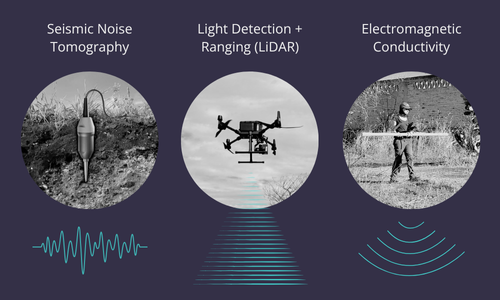On the Frontier of Finding Peace
This is a published version of our On the Frontier (OtF) newsletter series. Every month we take one global critical challenge and explore what’s at the cutting edge of it, together. Click here to join the FT Network and receive our newsletter directly.
Technological responses to disappearance in Mexico
When someone is "disappeared" in Mexico, families carry an immeasurable, haunting pain, rarely able to find the bodies of their loved ones, let alone alive.
Since 2006, over 120,000 disappearances have been reported, leading groups of Madres Buscadoras (searching mothers) to take up their own searches for clandestine graves. They have built an intricate understanding of the earth that may be hiding their loved ones.
During a powerful afternoon at Oxford University, a panel explored how technology is addressing disappearances in Mexico and bringing families closer to finding peace. Behind photos of the missing sat a technologist, artist, policy-maker, forensic archaeologist, human rights expert and one woman freshly arrived from Jalisco, Mexico just hours before.
Her name was Índira Navarro, leader of Guerreros Buscadores de Jalisco, and a collaborates with the FOUND project: a Frontier Tech pilot leading experiments to harness frontier technologies in this collective search for peace.
The pilot's FCDO Pioneer, Mariela Garfias, has written about the panel and project findings. Most importantly, she shares the signals of successful discovery that they have already found together.
Interpretating nature with sight and satellite
Each technology helps to look underground in different ways. This pilot's objective is to determine which combinations are best suited to different environments, because humidity, vegetation, soil health and elevation all pose challenges.
Tests are being conducted across four sites in Mexico, with both a high likelihood of hidden graves, but critically, diverse environmental factors, so that a tech stack can be deployed to amplify the existing efforts of the Madres Buscadoras.
Here are just three of the technologies being tested:
Seismic noise tomography is like an ultrasound for the earth. Multiple geophones are arranged in a grid, and together record vibrations to locate “soft spots”.
LiDAR is a drone-mounted laser scanner that zaps the ground millions of times per second, building hyper-detailed maps of the surface.
Electromagnetic conductivity uses a long, handheld coil which emits and measures gentle radio waves, to see how easily the currents pass through the soil.
Indira's reflections on technology
During the Oxford event, Índira's powerful stories of loss and resilience were translated to a silent audience. She shared the story of her search for her brother, Jesús Hernán Navarro who was "disappeared" in 2015, before recounting the events of discovery in detail.
Miguel Moctezuma of the Oxford Global Security Programme shared more, recounting the moment a mother found her son's possessions at a grave site, before picking up her tools to continue searching on behalf of others still in need of peace and information: "This is what I wanted. I wanted to know. Now I know. Let’s find more."
As the conversation turned to technology's potential, glimmers of hope and resilience shone through both the speakers and the audience's bated breath.
During the panel, Miguel asked Índira: "What have you seen technology achieve?"
Hear her answer directly in a 2-minute video, as she shares the value frontier technologies are offering Madres Buscadoras in their mission to find peace.
“We were able to detect, within 20 meters of precision, where the cremations happened. The ashes are still there.”
Dr José Luis Silván, CentroGeo
Still feeling curious? Here are three more highlights
Ps. Have you heard about our Helpdesk offer? 🧑💻
The Frontier Tech Helpdesk supports members of the FCDO to explore how emerging technology and innovations can shape their work by providing tailored research, evidence, and advisory support. In fact, the AI for Education topic brief mentioned above was produced in response to a Helpesk request by an FCDO colleague. Click here to learn more and submit a request!
Thanks for exploring with us. If you want to join us again to explore what's On the Frontier, then sign up to the Frontier Tech Network to recieve it directly!



